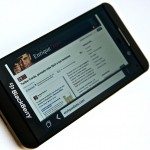 BlackBerry has more than 60 million users across the globe and is still the No. 1 enterprise communications security solution in the United States. 2013 will see not one, but two new phones by RIM (who recently re-branded itself as simply BlackBerry). It is also launching two software products for businesses that use the increasingly-popular BYOD (Bring Your Own Device) philosophy in the workplace.
BlackBerry has more than 60 million users across the globe and is still the No. 1 enterprise communications security solution in the United States. 2013 will see not one, but two new phones by RIM (who recently re-branded itself as simply BlackBerry). It is also launching two software products for businesses that use the increasingly-popular BYOD (Bring Your Own Device) philosophy in the workplace.
But that’s not the biggest news about BlackBerry this month. Perhaps the biggest move it’s making this year, is to make its BBM messaging service available to users who don’t actually use BlackBerry devices. That may not seem like as big a deal as a new phone or enterprise app, but its implications could actually be globally huge.
Is BlackBerry Getting Into Advertising?
There has been a lot of talk of BBM eventually serving up ads if it becomes popular enough. And that does seem like the most immediate profit possibility in the United States.
Aside from the obvious revenue possibilities, widely-available BBM may have other implications. If even a small percentage of Android and iPhone/iPad owners begin using the service, BlackBerry could potentially use this foothold the same way Google did with Yahoo in its beginning stages.
The ways that BlackBerry will leverage the spread of BBM still remain to be seen. But the possibility of utilizing the message service as an ad platform does loom fairly large.
The Global Market
BlackBerry has a huge foot in developing/third-world markets across the globe, including Asia, Eastern Europe, Africa and the Pacific. Its BBM service is popular in places where normal coverage is spotty. And BlackBerry devices often have bigger market share than Android and Apple devices in those countries.
Perhaps more importantly, smartphone usage hasn’t yet reached a saturation point in these markets. Letting users of other devices use its BBM service will only expand its popularity and reach, while also creating a certain amount of reliance on the company. With this new development, let us not forget the release of its less-expensive Q5 keypad smartphone this summer, widening its user base even more.
BlackBerry and BYOD
BlackBerry is still the No. 1 messaging security solution for large enterprises, and even the U.S. government transfers data via BlackBerry servers. And it just made a major play in the enterprise market with the release of two related products.
The prevalence of BYOD policies— which allow employees to use personal devices for work, creating security nightmares for IT and security personnel— has had many large enterprises scrambling for mobile device management (MDM) solutions to keep their data secure.
BlackBerry just unveiled two products into this field: The BlackBerry Enterprise Server (for device management) and a mobile app that partitions data on mobile devices, so that an employee’s business data and personal data are kept separate from each other. This allows the business data to be managed by Enterprise Server, while leaving personal data strictly personal.
It’s likely no coincidence that BlackBerry is unleashing its “BBM for all” service alongside its security software. Suddenly, users of all sorts of devices could be using two different BlackBerry apps on their mobile devices. Where will this increased reach lead? It will be interesting to see what the company has up its sleeve next.
Related articles






